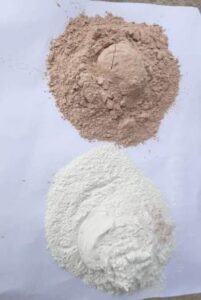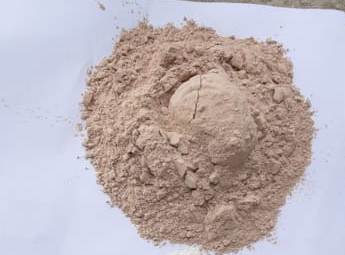Essential for Efficient Drilling Operations
Bentonite plays a crucial role in oil and gas exploration. It is an essential material used in oil well drilling to stabilize the wellbore, control pressure, and prevent damage to the well structures. In this article, we explore why bentonite is the preferred choice for oil well drilling, its primary applications, and the benefits it provides.

What Is Bentonite?
Bentonite is a natural clay mineral, primarily made of montmorillonite. When mixed with water, it forms a gel-like consistency. This unique property makes bentonite ideal for creating drilling fluids, or drilling mud. The most common form used in drilling is sodium bentonite. This type of bentonite expands when exposed to water, forming a thick, viscous mud that is crucial in oil well drilling.
Primary Applications of Bentonite in Oil Well Drilling
1. Preparation of Drilling Fluid
The most important application of bentonite in oil well drilling is in drilling mud preparation. Drilling fluid serves many purposes during drilling, including:
- Lubricating the drill bit: Bentonite mud reduces friction between the drill bit and the rock formations, making it easier to penetrate deeper into the earth.
- Cooling the drill bit: The mud helps maintain the optimal temperature of the drill bit, preventing overheating.
- Suspending cuttings: As drilling progresses, rock cuttings are created. The bentonite mud suspends these cuttings, allowing them to be transported to the surface.
Bentonite is integral to the function of drilling fluid, ensuring smooth and efficient operations.
2. Maintaining Wellbore Stability
Wellbore stability is crucial for successful drilling. As the drill bit advances through rock formations, the wellbore can collapse if not properly managed. Bentonite plays a key role in preventing this by:
- Sealing the wellbore: Bentonite mud forms a protective layer around the wellbore, preventing fluid inflows from surrounding formations.
- Pressure control: Bentonite’s high viscosity helps to maintain balanced pressure in the wellbore, preventing any sudden pressure changes that could result in accidents.
With its excellent sealing and pressure-controlling properties, bentonite helps maintain a stable wellbore throughout drilling.
3. Pressure Control and Containment
Pressure management is critical for safe drilling. If the pressure inside the wellbore becomes too high or too low, it can cause equipment failure, uncontrolled fluid flows, or blowouts. Bentonite mud helps with pressure control in the following ways:
- Hydrostatic pressure: Bentonite mud creates a slurry with high density, which generates the necessary hydrostatic pressure to counterbalance the pressure from underground formations. This helps to keep gas and fluids from entering the wellbore.
- Blowout prevention: By maintaining consistent pressure in the wellbore, bentonite reduces the risk of dangerous blowouts, where gas or oil can escape uncontrollably.
Bentonite is vital in maintaining pressure balance, which is crucial for safe and efficient drilling operations.
4. Efficient Cuttings Removal
Drilling produces cuttings—small fragments of rock that need to be removed from the wellbore to keep operations running smoothly. Bentonite-based mud aids in:
- Suspending cuttings: Bentonite mud is thick enough to keep cuttings suspended and prevent them from clogging the drilling system.
- Transporting cuttings to the surface: Once cuttings are suspended, they are carried to the surface, where they can be disposed of or treated.
Bentonite’s ability to remove cuttings efficiently contributes to smoother, uninterrupted drilling operations.
Benefits of Using Bentonite in Oil Well Drilling
1. Enhanced Drilling Efficiency
Bentonite-based mud reduces friction between the drill bit and the formation, allowing the drill to penetrate faster. The cooling properties of the mud also help keep the equipment in top condition. All these factors result in faster drilling and reduced equipment wear, saving both time and money.
2. Improved Pressure Control
Bentonite helps maintain wellbore pressure by balancing the pressure from surrounding rock formations. Its high density helps prevent dangerous fluid influxes, ensuring that the well remains under control throughout the drilling process.
3. Cost-Effectiveness
Bentonite is affordable and highly effective. Its cost-effectiveness makes it a widely used material for oil drilling. Since it helps optimize drilling operations and prevent costly problems like blowouts, it provides excellent value.
4. Environmentally Friendly
Bentonite is a naturally occurring material, and many bentonite muds are biodegradable. This makes bentonite a more environmentally friendly option compared to other drilling fluids that may use harmful chemicals. Bentonite’s natural properties contribute to safer, greener drilling operations.
Bentonite’s Role in Enhancing Safety During Drilling
Safety is the top priority in oil well drilling. Bentonite’s role in drilling extends to ensuring the safety of workers and the environment. Here’s how:
- Blowout prevention: By maintaining consistent pressure in the wellbore, bentonite prevents dangerous situations like blowouts. These can occur when pressure is not adequately controlled, posing risks to both personnel and the environment.
- Protecting equipment: The lubrication and cooling effects of bentonite reduce friction and wear on drilling equipment, which helps prevent equipment failure and costly downtime.
- Eco-friendly disposal: Since bentonite is biodegradable, it poses less of an environmental hazard compared to other synthetic drilling fluids. Proper disposal of bentonite mud can minimize the impact on surrounding ecosystems.
Bentonite’s environmentally friendly nature and pressure-control capabilities make it a safe and reliable material for oil drilling operations.
Conclusion
Bentonite is indispensable in the field of oil well drilling. Its role in drilling fluid preparation, wellbore stabilization, pressure control, and cuttings removal makes it a crucial material for drilling operations. Thanks to its high absorbency, viscosity, and gel formation properties, bentonite helps improve the efficiency and safety of the drilling process.
By offering benefits such as cost-effectiveness, environmental friendliness, and enhanced safety, bentonite remains a top choice for drilling fluid manufacturers and operators. As oil and gas exploration continues to evolve, bentonite will remain a critical component of successful and sustainable drilling operations.
https://iranmineral.net/biggest-bentonit…-white-suppliers/

